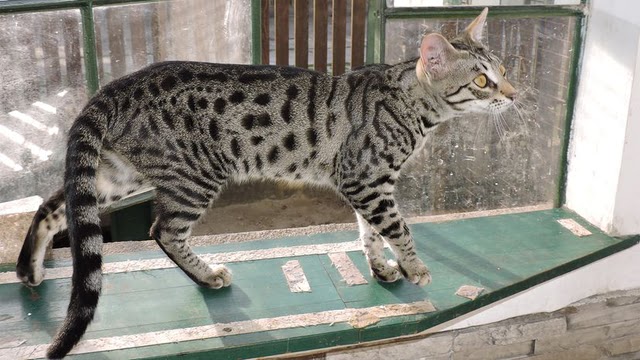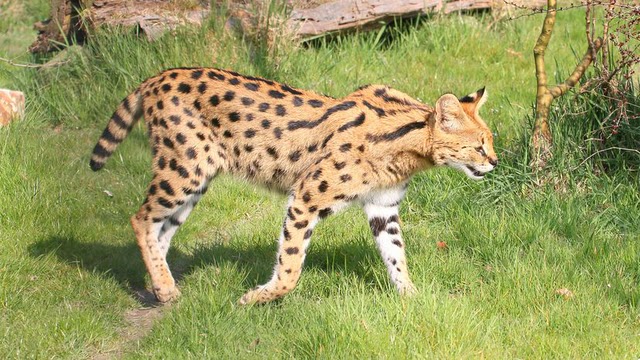Quck answer
The Savannah cat is a hybrid breed created by crossing a domestic cat with a serval, a wild African cat. They are known for their unique appearance and playful personalities, but their creation and ownership is controversial. Some argue that breeding and owning Savannah cats is unethical, as it exploits wild animals and perpetuates the exotic pet trade. Others argue that responsible breeding and ownership can provide a safe and loving home for these cats, and that they can even serve as ambassadors for their wild counterparts. Ultimately, it is up to individuals to weigh the ethical considerations and make informed decisions about owning a Savannah cat.
Pets

A domesticated Savannah cat walks around. The International Cat Association recognizes the Savannah cat as a registered breed, but the Cat Fancier’s Association refuses to acknowledge it as legitimate because it is a hybrid between a wild cat and a domestic cat. Wikimedia Commons (CC By-SA 4.0)
In the autumn of 2006, a large, spotted, wild-looking cat began appearing in the streets and backyards of Nicasio, California. The onlookers believed it was a cheetah roaming the neighborhood. It was too small to be a mountain lion and too long-tailed to be a bobcat, and it didn’t resemble any of the state’s native feline species. But surprisingly, it turned out to be a family pet named Mondo, who had traveled 10 miles (16 kilometers) from its San Anselmo household. Mondo was a Savannah cat, a new breed developed by crossing a domestic cat with a wild African feline called the serval (Leptailurus serval).
Savannah cats are known for their exotic beauty, athleticism, and curious nature. They weigh up to 25 pounds (11.3 kilograms) and are about half the size of their ancestral servals, but they can hold their own against gigantic breeds like the Maine Coon and the Norwegian Forest cat. Savannah cats have tall, pillar-like legs which give them an impressive standing height of 16 inches (40.6 centimeters) or more, and huge, rounded ears, just like their wild ancestors. They have short hair that’s relatively easy to groom, and their fur pattern is similar to that of serval cats, with tannish-yellow fur, white underbelly, and leopard-esque black spots. However, some Savannah cats have dark brown or silver fur.

A wild male serval cat (Leptailurus serval). Serval cats are medium-sized African wild cats.
Ger Bosma/Getty Images
Although Savannah cats are beautiful and fascinating, some organizations have raised concerns about their morality and ethics. The Cat Fancier’s Association refuses to acknowledge Savannah cats as legitimate because they are a hybrid between a wild cat and a domestic cat. Some people believe that breeding Savannah cats is a form of exploitation and harms the population of serval cats in the wild. However, Savannah cat owners defend their pets and argue that they are loving companions that are well-suited for domestic life.
Despite the controversy surrounding Savannah cats, they remain a popular and sought-after breed. But owning a Savannah cat comes with some challenges, such as their athleticism and curious nature. Savannah cats can leap 8 feet (2.5 meters) vertically from a standing or squatting position, so it’s important to “childproof” the house if you decide to get one. New owners are encouraged to put childproof latches on any cupboards with potentially dangerous contents, such as toxic cleaning products.
When it comes to keeping Savannah cats secure, a standard suburban fence is not high enough to contain them. Most owners only allow their cats outdoors if they have access to a leash or build backyard enclosures with sturdy roofing. Properly balanced raw diets are recommended for Savannah cats, but if not feasible, canned cat food is a better option than dry food. Breeders classify Savannah cats on the basis of genealogy, with those whose parents were serval cats being considered “F1”. Physical differences can be observed between cats of successive generations. The legal regulations on owning Savannah cats vary from place to place, with some countries banning them outright due to their exotic nature. The Cat Fancier’s Association does not recognize them as a legitimate breed, but the International Cat Association has been registering them since 2001. Savannah cats are known for their affable personalities and love for water, and prices for them can range from $1,000 to $35,000.
FAQ
1. What is a Savannah Cat?
A Savannah Cat is a crossbreed between a domestic cat and a serval, a wild African cat. They are known for their unique spotted coat and tall, slender build.
2. Are Savannah Cats legal to own?
It depends on the state or country. In the United States, some states have restrictions or bans on owning Savannah Cats, while others do not. It is important to research and understand the laws in your area before obtaining a Savannah Cat.
3. Are Savannah Cats good pets?
Yes, Savannah Cats can make great pets for the right owner. They are intelligent, active, and have a playful personality. However, they require a lot of attention and socialization, and may not be suitable for everyone.
4. How much does a Savannah Cat cost?
The cost of a Savannah Cat can vary depending on the breeder, generation, and location. Prices can range from a few thousand dollars to over $20,000 for a high-quality, purebred Savannah Cat.
5. Are Savannah Cats hypoallergenic?
No, Savannah Cats are not hypoallergenic. They still produce allergens like any other cat, and may not be suitable for people with severe allergies.
6. Do Savannah Cats make good indoor pets?
Yes, Savannah Cats can adapt well to living indoors as long as they have enough space and stimulation. They are highly active and require regular exercise and playtime.
7. Can Savannah Cats be trained?
Yes, Savannah Cats are highly intelligent and can be trained to do tricks and follow commands. However, it may take more time and patience compared to training a regular domestic cat.
8. Are Savannah Cats dangerous?
Savannah Cats are not inherently dangerous, but they do have a wild ancestry and may exhibit more aggressive behavior compared to a regular domestic cat. It is important to properly socialize and train a Savannah Cat to prevent any potential issues.
9. How big do Savannah Cats get?
Savannah Cats can range in size depending on the generation and breeding. They can weigh anywhere between 8 to 25 pounds and stand up to 2 feet tall.
10. Can Savannah Cats be bred with other cat breeds?
Technically, yes, Savannah Cats can be bred with other cat breeds. However, it is not recommended as it can dilute the unique traits and characteristics of the Savannah Cat breed.
11. What is the controversy surrounding Savannah Cats?
Some people argue that breeding Savannah Cats is unethical and exploitative, as it involves mating a wild African cat with a domestic cat. Others believe that as long as the breeding is done responsibly and with the cat’s welfare in mind, Savannah Cats can make wonderful pets.





Leave a Reply